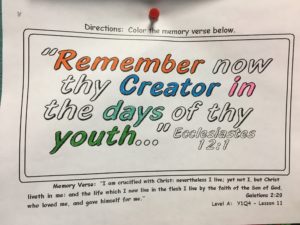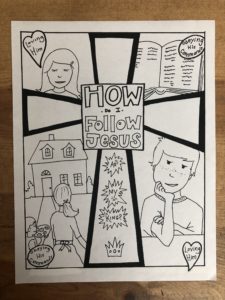Key Verse
“I am crucified with Christ: nevertheless I live; yet not I, but Christ liveth in me: and the life which I now live in the flesh I live by the faith of the Son of God, who loved me, and gave himself for me.” Galatians 2:20
Read the Key Verse with your class. Ask: How can we be “crucified with Christ”? (By dying to our own selfish desires and living a life pleasing to God.) Ask your students if they understand what it means when it says “nevertheless I live; yet not I, but Christ liveth in me.” (Once a person is saved, they are to no longer do what they want, because they are a sinful creature, but they are to do what Jesus wants them to do.) In living a life “in the flesh I live by the faith of the Son of God”, means that even though we live here on the earth, in the flesh, we live a life of faith because we believe Jesus died on the cross, paying the penalty for our sins, so that we can live forever with him in heaven for eternity. Encourage your students to keep this in mind as we continue our study of Solomon’s conclusions as we complete the book of Ecclesiastes.
Summary: Today we continue with the fourth of the Personal books, Ecclesiastes. In our second week of studying the book, we remember that it was written by King Solomon, the man who had it all – riches, fame, rich heritage, a personal relationship with God, and wisdom beyond measure. Remember he found that all of life is “vanity and vexation.” (vanity: any thing that is futile, or worthless. vexation: something that disturbs or annoys; to trouble seriously.) Because Solomon had not learned how to restrain his desires he found they were the cause of all of his “vanity and vexation.”
Last week we found King Solomon recognized the fool he had become in turning from God. Even with all of his wisdom, Solomon did not have all of the answers of life. We continue our study this week discovering other truths Solomon learned. Solomon learned there are only two kinds of people; wicked or righteous. God takes care of the righteous, but all people will one day die. Only the righteous have hope (of eternity in heaven with Jesus). After trying to make sense of life apart from God, Solomon found he couldn’t. Solomon concluded, late in life, that it really is important what you do with your life. He finally understood the importance of remembering the Creator in the days of your youth (while one is young in life) before evil takes root in ones life. Once Solomon learned these very basic principles, he recorded them for all generations to come. He found it so important to warn everyone that he ended the book of Ecclesiastes with these words: Ecclesiastes 12:13-14: “13. Let us hear the conclusion of the whole matter: Fear God, and keep his commandments: for this is the whole duty of man. 14. For God shall bring every work into judgment, with every secret thing, whether it be good, or whether it be evil.”
Encourage your students to bring their Bibles and use them!
Emphasis: Man’s duty is to fear God and to keep His commandments. Only in this will we please Him.
Optional Worksheets to be downloaded:
Lesson 50 – Volume 1 Children’s Worksheet 1
Lesson 50 – Volume 1 Children’s Reinforcement Worksheet
Ideas for children:
Stickers always work well with children. Often times I watch Wal-Mart or Oriental Trading Company for specials or deals on things I can use for crafts for Sunday School (i.e. foam sheets, Bible Story scene stickers, crowns, stick on jewels, construction paper, etc.). I keep a stash and when I need something, I go search in my stash! Pinterest always has great ideas!
You could have a coloring sheet that goes with the lesson.
One idea for today’s lesson: (See picture below). For today’s lesson I found a coloring sheet with a cross with the words “How do I Follow Jesus”. It had pictures such as going to church, reading the Bible and loving Him. As we colored the picture, we discussed ways we can follow Jesus (i.e. obeying parents, choosing to do right, being kind one to another, etc.). We also colored the verse from today’s lesson (the Children’s Reinforcement Worksheet).
Mural idea:
Refer to the wall in your classroom that has become a mural.
By now your class should be in a groove as to the direction and areas in which they need to focus and work on to improve their Christian lives. Use this knowledge to help you address specific areas in each lesson that your class can discuss and share as you add new things to your mural. Continue to watch as your class grows in their knowledge of not only God’s Word, but areas in their lives that can be corrected, drawing them closer to the Lord.
Have them each add anything else they may have brought to add to the wall. Encourage everyone to participate.

